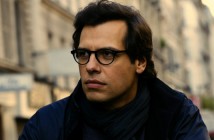
The Killing (1956)
Cast: Sterling Hayden, Coleen Gray, Vince Edwards
Directors: Stanley Kubrick
Country: USA
Genre: Crime | Film-Noir | Thriller
Editor’s Notes: The following review is part of our coverage for TIFF’s Stanley Kubrick: A Cinematic Odyssey. For more information on upcoming TIFF film series visit http://tiff.net and follow TIFF on Twitter at @TIFF_NET.
After years of independently produced shorts and films, Stanley Kubrick would turn a chance meeting with a movie producer over a game of chess into what Roger Ebert called the director’s “first mature feature:” The Killing (1956). A fractured, late-cycle film noir, The Killing may have been ignored at the box office, but it received critical acclaim, with some critics comparing Kubrick to the intellectual wunderkind of the previous generation, Orson Welles. Indeed, it is impossible to imagine The Killing existing in a world without Welles, and in turn, it’s impossible to imagine Welles’ later work without The Killing.
… it is impossible to imagine The Killing existing in a world without Welles, and in turn, it’s impossible to imagine Welles’ later work without The Killing.
Johnny Clay (Sterling Hayden) has a plan. It’s a foolproof plan, he says, the ultimate caper: the theft of $2 million from a racetrack. But it’s a heist scheduled for broad daylight and requires the services of a host of men who have never pulled off a robbery before. These men are given only the scant information they need, “For your own protection,” Johnny says. We see the events unfold in fragments and from a host of different perspectives, a narrator sporadically intoning the time and date, helping us keep this nonlinear narrative organized in our heads. We in the audience are a lot like Johnny, taking pieces of a complicated puzzle and working them until they form a cohesive design.
 Unlike Johnny, we have most of the pieces of that puzzle. While he thinks Sherry (Marie Windsor), wife of one of the track employees involved in the scheme (Elisha Cook., Jr.), is just a nosy broad who can be chased away with a few empty threats, we know the full extent of her duplicity. We know who amongst the gang really needs the dough, who’s just greedy, and who’s got more problems than Johnny could ever imagine. What we never truly know is why Johnny Clay needs the money. It’s as if the money is secondary, it was the power and control over others he was really after all along.
Unlike Johnny, we have most of the pieces of that puzzle. While he thinks Sherry (Marie Windsor), wife of one of the track employees involved in the scheme (Elisha Cook., Jr.), is just a nosy broad who can be chased away with a few empty threats, we know the full extent of her duplicity. We know who amongst the gang really needs the dough, who’s just greedy, and who’s got more problems than Johnny could ever imagine. What we never truly know is why Johnny Clay needs the money. It’s as if the money is secondary, it was the power and control over others he was really after all along.
Kubrick makes use of plenty of crime drama tropes, which give The Killing a charming B-movie sensibility. There is the ubiquitous reused footage of lower-budget films, but instead of being used to stretch a budget, these scenes anchor chunks of the nonlinear narrative together. Then there’s the dialogue, sometimes goofy, other times as subtle as a two-ton anvil, but never the product of a quickie script. It’s a conceit cleverly utilized to give the audience a false sense of security. Surely nothing monstrous could come from all this, the audience thinks. Why, even Sherry is more funny than dangerous, not so much a femme fatale than an Alice Kramden in lingerie… at first.
Kubrick makes use of plenty of crime drama tropes, which give The Killing a charming B-movie sensibility.
This fantastic, diversionary dialogue comes courtesy legendary pulp author Jim Thompson. Johnny’s dialogue in particular sounds like so much gibberish at times, very much reflective of the non-specific plotting noir audiences were used to. But this is not just adherence to established noir tropes: Johnny, as his good friend Maurice (Kola Kwariani) tells him, is not as smart as he thinks he is. Though fate and circumstance figure heavily into the failure of the heist, it’s clear that Johnny focuses on a strict schedule at the expense of other concerns. After all, what’s the use of being on time if what you do during that time is so easily mucked up?
It’s probably no coincidence that, just as the heist is about to begin, the narrator — the unseen man who has helped us through the disjointed chronology — loses all sense of time; the timetable, as George says late in the film, has broken down. It’s so broken, in fact, we start to encounter almost metaphysical anomalies, the first when the narrator places Johnny in two locations at exactly 7:00 p.m. While one can picture him, ego bubbling along, fancying himself so in control of the world that he could indeed exist in two disparate places at once, the truth is that things have gone so wrong that time itself is out of order, and Johnny doesn’t know it yet.
It’s equivocal whether the audience knows it, either, at least on a conscious level. After more than an hour of relying on that unseen, omniscient authority to help us put the fractured pieces of the plot together, we trust him to tell us the truth. Instead, he begins to tell us impossible things, that Nikki has died before the race he was watching even started, that no matter what time it really is, Johnny is forever exactly 15 minutes late for the final meet-up.
At this point, the nonlinear narrative has fractured as much as Johnny’s plan. Writer and philosopher Steven M. Sanders considers Kubrick to have been “stacking the deck” against the heist throughout the film, flaunting his directorial control by having Johnny and others engage in behavior that is decidedly out of character simply to throw obstacles into their path. It’s more likely that Kubrick considered himself the ultimate deliverer of capital-F Fate, an unseen character in his own movie, micromanaging the film the same way Johnny Clay, as in feet of, micromanaged the heist. Details were hidden and revealed to make a scenario more interesting, just as Johnny refused to reveal certain details to his crew. And after calling the pathologically impotent George a clown early in the film, Johnny’s choice to don his own clown mask during the robbery is an interesting one indeed, especially if he is, on some level, analogous to Kubrick himself.
Perhaps Johnny, somewhere in the back of his mind, knew that there were always unseen forces working against him, things he couldn’t control, that he was more of a fool than he would ever consciously admit. Kubrick certainly knew that he was in control of that artificial world Johnny Clay lived in, and took no great pains to hide the fact that he, not Johnny, was the god here. This gives The Killing a more urgent and gritty feel than Kubrick’s later films, but also a less structured feel, despite the meticulous organization that went into the splintered narrative. It is a fine work and a solid film noir, but very much an early work, a precursor to Kubrick’s more polished and intricate films.
The Killing has a more urgent and gritty feel than Kubrick's later films, but also a less structured feel, despite the meticulous organization that went into the splintered narrative. It is a fine work and a solid film noir, but very much an early work, a precursor to Kubrick's more polished and intricate films.



